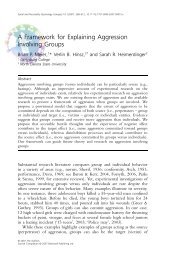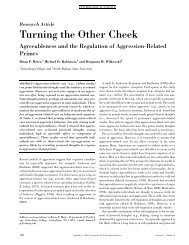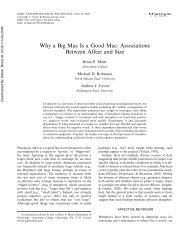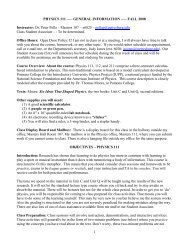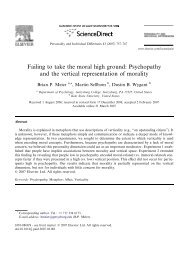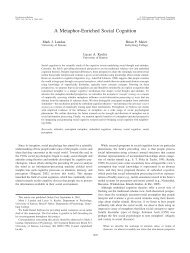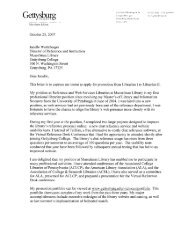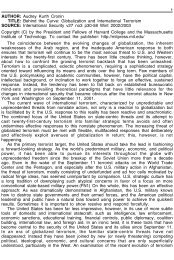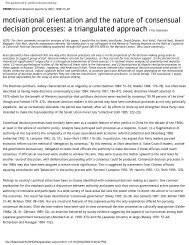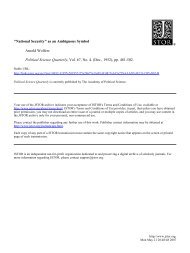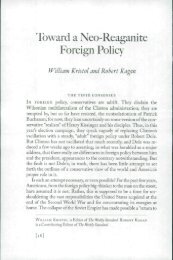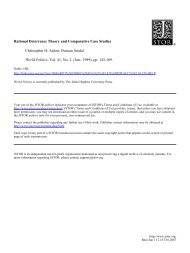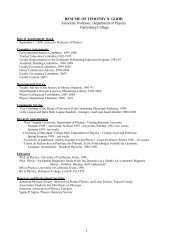Francis Fukuyama. 1995 "Social Capital and the Global Economy."
Francis Fukuyama. 1995 "Social Capital and the Global Economy."
Francis Fukuyama. 1995 "Social Capital and the Global Economy."
You also want an ePaper? Increase the reach of your titles
YUMPU automatically turns print PDFs into web optimized ePapers that Google loves.
<strong>Social</strong> <strong>Capital</strong> <strong>and</strong> <strong>the</strong> <strong>Global</strong> <strong>Economy</strong><br />
world remain, <strong>the</strong>ir scope has narrowed considerably over <strong>the</strong> past<br />
couple of generations as <strong>the</strong> socialist alternative collapsed <strong>and</strong> nations<br />
became ever more interdependent through trade <strong>and</strong> investment.<br />
The essential meaning of <strong>the</strong> end of history is not that turbulence has<br />
ceased or that <strong>the</strong> world has become completely uniform, but ra<strong>the</strong>r<br />
that <strong>the</strong>re are no serious systematic institutional alternatives to liberal<br />
democracy <strong>and</strong> market-based capitalism for <strong>the</strong> world's most<br />
advanced countries. Put ano<strong>the</strong>r way, social engineering, while at one<br />
time <strong>the</strong> key to progressive government, has today reached a dead<br />
end. The most important factors affecting <strong>the</strong> real quality of life in<br />
such societies lie safely beyond what national governments can affect<br />
in positive ways. For while state power can effectively undermine civil<br />
society by uprooting neighborhoods, abolishing communities, <strong>and</strong><br />
creating perverse incentives that destabilize two-parent families, it is<br />
much less able to promote strong bonds of special solidarity or <strong>the</strong><br />
moral fabric that underlies community.<br />
Institutional convergence has not, however, meant an end of<br />
significant differences between modern societies. In <strong>the</strong> post-Cold<br />
War world, <strong>the</strong> most important distinctions between nations are no<br />
longer institutional but cultural: it is <strong>the</strong> character of <strong>the</strong>ir civil societies,<br />
<strong>the</strong> social <strong>and</strong> moral habits that underlie institutions, that<br />
differentiate <strong>the</strong>m. In this respect, Samuel Huntington has been<br />
quite right to assert that culture will be <strong>the</strong> key axis of international<br />
differentiation—though not necessarily an axis of confiict.<br />
The traditional argument between left <strong>and</strong> right over <strong>the</strong> appropriate<br />
role of <strong>the</strong> state, refiected in <strong>the</strong> debate between <strong>the</strong> neomercantilists<br />
<strong>and</strong> neoclassical economists, misses <strong>the</strong> key issue concerning<br />
civil society. The left is wrong to think that <strong>the</strong> state can embody<br />
or promote meaningful social solidarity. Libertarian conservatives,<br />
for <strong>the</strong>ir part, are wrong to think that strong social structures will<br />
spontaneously regenerate once <strong>the</strong> state is subtracted from <strong>the</strong> equation.<br />
The character of civil society <strong>and</strong> its intermediate associations,<br />
rooted as it is in nonrational factors like culture, religion, tradition,<br />
<strong>and</strong> o<strong>the</strong>r premodern sources, will be key to <strong>the</strong> success of modern<br />
societies in a global economy. ^<br />
FOREIGN AFFAIRS- September/October ig% [ 10 3 ]



